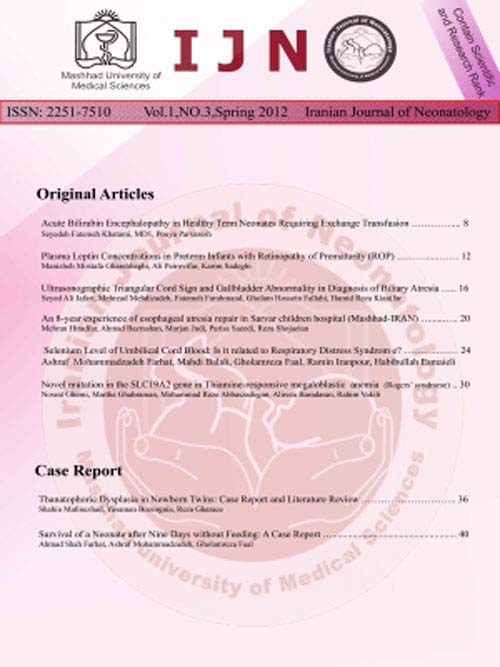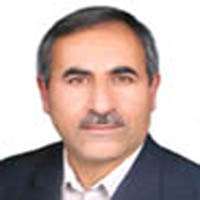Nutritional Support of Critically ill Neonates in Post-Gastrointestinal Surgery State: Adequacy and Barriers
Author(s):
Article Type:
Research/Original Article (دارای رتبه معتبر)
Abstract:
Background
The optimum nutritional support of critically ill neonates is considered an essential aspect of their medical management since they are susceptible to rapid nutritional depletion, loss of fat-free mass, organ failure, delayed wound healing, and diminished immune function in the post-gastrointestinal surgery state. Providing appropriate nutritional support for these high-risk patients is a very complex and critical process accompanied by many potential errors. To the best of our knowledge, this study has been the first attempt investigating the energy and protein adequacy and probable barriers to the achievement of nutritional goals in such patients.Methods
The present study was carried out at Akbar Children’s Hospital in Mashhad, Khorasan Razavi province, Iran, during 8 months in 2019. All the gastrointestinal surgical patients admitted to the neonatal intensive care unit (NICU) for at least 72 h were eligible for enrollment in the study. The information on age, gender, primary surgical diagnosis, route of nutritional support, adequacy of received energy and protein, probable barriers to the achievement of nutritional goals, and clinical outcomes were collected in this study.Results
Totally, 59 eligible neonates were included in the study 59.3% (n=35) of whom were male. Among different methods of nutritional support, enteral nutrition (47.5%) was the most frequently used feeding route. Energy and protein adequacy was observed in 35.5% and 79.7% of the patients, respectively. The fluid restriction was the major barrier to the provision of optimum nutritional support, affecting 38.9% of the patients. Finally, nutritional adequacy was observed to be significantly associated with decreased infection rate and length of hospital stay.Conclusion
While 64.5% of the studied neonates did not receive adequate energy, almost 80% of them had adequate protein intake during their post-gastrointestinal surgery state. The awareness of the fluid restriction and non-availability of calorie-dense solutions as the most frequent barriers to the achievement of nutritional goals may lead to making reasonable and realistic decisions on the customized protocols of the NICU patients as well as medical management and insurance coverage of required nutritional products.Keywords:
Language:
English
Published:
Iranian Journal of Neonatology, Volume:11 Issue: 4, Autumn 2020
Pages:
57 to 63
magiran.com/p2188713
دانلود و مطالعه متن این مقاله با یکی از روشهای زیر امکان پذیر است:
اشتراک شخصی
با عضویت و پرداخت آنلاین حق اشتراک یکساله به مبلغ 1,390,000ريال میتوانید 70 عنوان مطلب دانلود کنید!
اشتراک سازمانی
به کتابخانه دانشگاه یا محل کار خود پیشنهاد کنید تا اشتراک سازمانی این پایگاه را برای دسترسی نامحدود همه کاربران به متن مطالب تهیه نمایند!
توجه!
- حق عضویت دریافتی صرف حمایت از نشریات عضو و نگهداری، تکمیل و توسعه مگیران میشود.
- پرداخت حق اشتراک و دانلود مقالات اجازه بازنشر آن در سایر رسانههای چاپی و دیجیتال را به کاربر نمیدهد.
In order to view content subscription is required
Personal subscription
Subscribe magiran.com for 70 € euros via PayPal and download 70 articles during a year.
Organization subscription
Please contact us to subscribe your university or library for unlimited access!




